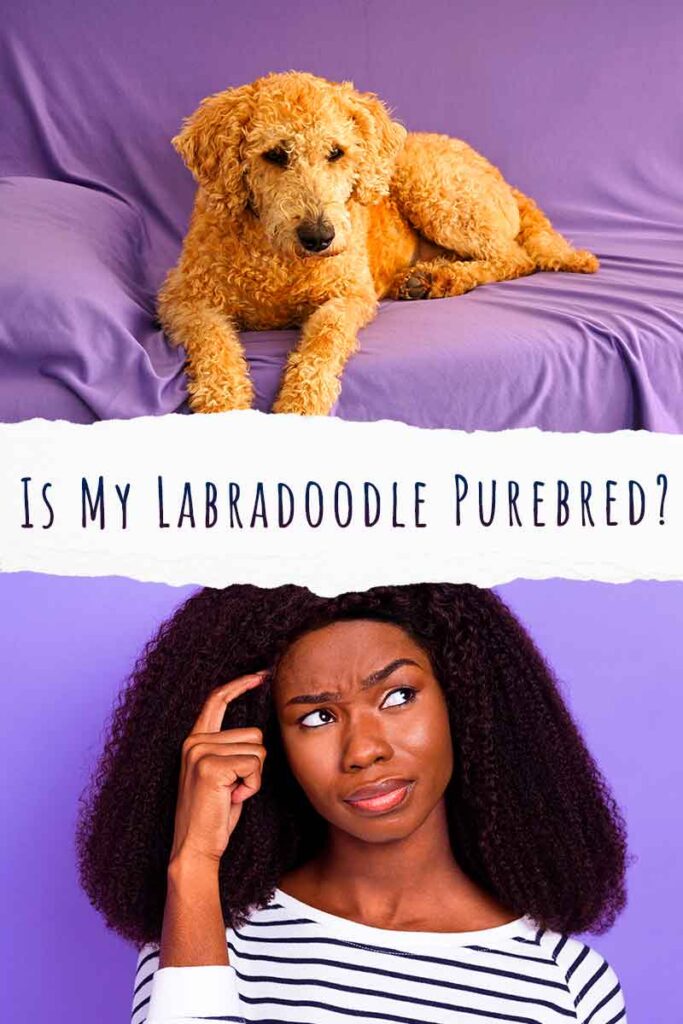Is my Labradoodle purebred?
The simple answer to this question is no, unless they are an Australian Labradoodle.
There are a few reasons why Labradoodles and other mixed breed dogs are not referred to as purebred.
And why Australian Labradoodles may be an exception.
We’ll unravel all of them in this article.
What does it mean to be purebred?
The word purebred means “bred from members of a recognized breed, strain, or kind, without admixture of other blood over many generations.”
In other words, purebred dogs are recognized as being ‘of the same type’ as the other dogs in their breed. And their family tree consists only of dogs which also match that type, going back for many generations.
To keep track of these requirements, dog breeders write a breed standard to decide what qualities define their breed. And then they use pedigree records to keep track of all the puppies which descend from the founding dogs which met that standard.
Breed registries like the American Kennel Club (AKC) offer a way of formalizing a breed’s breed standard, and certifying puppies who can prove their ancestry.
Are Labradoodles purebred dogs?
Labradoodles are usually a first generation cross.
First generation Labradoodles have one Labrador Retriever parent, and one Poodle parent.
Even though Labs and Poodles can be purebred and AKC registered, Labradoodles are not purebred themselves. Because their parents do not belong to the same type.
So, first generation Labradoodles can’t be AKC registered (or “papered”), and don’t qualify for a pedigree name.
But their breeder might offer you evidence of their parents’ pedigrees, to better illustrate their puppies’ background.
What about Australian Labradoodles?
Australian Labradoodles are the result of a breeding project to standardize Labradoodles, and establish them as a pedigree breed in their own right.
Note that “Australian” is part of their breed name, not just a description of where they come from. They can be bred in any country, and not every Labradoodle bred in Australia is an Australian Labradoodle. Much like German Shepherds and Yorkshire Terriers.
Aussie Labradoodle breeders have written a breed standard to describe the qualities they think an ideal Australian Labradoodle should have.
And an Australian Labradoodle can be purebred if they are descended from many generations of previous Australian Labradoodles.
The Australian Labradoodle Association maintains pedigree records of qualifying purebred dogs. But they are not yet recognized by the AKC.
Does being purebred matter?
This is a thorny subject.
First-generation crosses of two different dogs breeds (also known as designer dogs) have surged in popularity in recent years.
But some people disapprove of them. And still more people probably don’t have strong feelings either way.
The reality is that both purebred and mixed breed dog have drawbacks, and things that recommend them, and disadvantages.
You can decide for yourself whether having a purebred dog matters to you.
But one thing that should matter to everyone is responsible breeding.
And unfortunately whenever any kind of dog becomes popular, it also become vulnerable to exploitations by bad breeders.
Why is this important?
Responsible Labradoodle breeders will make sure that the Labradoodles they sell are as healthy as possible.

Both the Labrador Retriever and the Poodle can pass on genetic health conditions to their offspring, so you should always look for a breeder who tests for good health.
Good breeders also socialize puppies carefully from a young age, to help them grow into well-adjusted adults.
If you buy a Labradoodle puppy from an online website or retail pet store, it is likely that your dog comes from a large scale, for profit breeding operation known as a puppy mill.
Dogs reared in puppy mills are more likely to be in poor health, have underlying hereditary diseases, and display unwanted behavior like fear-based aggression.
This can make them expensive and stressful pets.
Puppy mills are likely to breed Labradoodles because they are highly sought after, and easy to sell.
Fortunately, there are organizations that work with breeders to maintain standards and ethics for Labradoodle breeding.
Let’s look at the benefits of choosing a Labradoodle puppy from a reputable breeder.
How to Find a Quality Breeder
As we’ve said, the first step in finding a good breeder is to stay away from brick and mortar pet stores. Regional Labradoodle clubs and associations usually maintain lists of vetted and approved breeders.
Once you narrow your search to legitimate Labradoodle breeders your choices may be more limited, but you will end up with a healthier dog.
What should you look for in a breeder?
Whether you are getting a Labradoodle or any other purebred or mixed breed dog, there are a few simple things to keep in mind when searching for a breeder.
Here’s some basic advice from the experts:
- Talk to local veterinarians and other dog owners to find responsible breeders in your area. Most breeders should also be able to provide you with referrals from previous clients.
- Choose a breeder near you who welcomes potential clients into their homes and/or kennels for an in-person visit. Check for signs of quality care like space and cleanliness.
- A responsible breeder who cares about where their puppies go will have as many questions for you as you have for them. Expect questions about your home, lifestyle, veterinarian, and experience with other pets.
- Look for a breeder who shares all health information with you. Besides your puppy’s veterinary records, you should see all health screening results too. Look for health test documentation from organizations like the Orthopedic Foundation for Animals (OFA).
- A reputable breeder will provide you with a written contract and health guarantee. Expect to sign a contract saying you will return the dog to the breeder if you can no longer care for it. A health guarantee ensures that the breeder will take the puppy back and provide you with a refund if a health problem is diagnosed within a specified timeframe after purchase.
This is general advice that applies to any dog breed. Are there any special considerations for Labradoodles?
We’ll talk about finding a good Labradoodle breeder next.
How to Find a Quality Labradoodle Breeder
What do you need to know to make sure that your new Labradoodle is healthy and comes from a caring environment?
Your can start looking for that perfect Labradoodle puppy by checking out the websites of the various Labradoodle associations.
Remember, since the Doodle is not a “purebred” dog, you won’t find referrals to Labradoodle breeders through the American and UK Kennel Clubs.
The Australian Labradoodle Association of America maintains a list of member breeders on their website.
They emphasize responsible breeding practices and health testing and expect member breeders to follow their code of ethics.
There is also an Australian Labradoodle Club of America. You can search for accredited breeders on their website. They also ask member breeders to sign a code of ethics.
The Worldwide Australian Labradoodle Association has member breeders in the United States, Canada, Europe, Australia, New Zealand, and South America.
They also have a code of ethics and expect members to follow all rules and regulations, including health testing.
Proper health testing is an important component of responsible Labradoodle breeding.
How to Avoid Puppy Mill Labradoodles
On the other hand, how can you spot a puppy mill Labradoodle? Here’s what you should know.
Because the Labradoodle is such a popular dog, many unscrupulous breeders will offer them for sale via websites, online ads, and in pet stores.
Here are a few warning signs for puppy mill dogs:
- Avoid breeders who do not let you make on-site visits and will only ship their puppies to you or say they will show you one puppy at an off-site location.
- Be wary of any breeding operation that offers multiple breeds of dog for sale, especially if they are all trendy breeds or trendy mixed breeds.
- If a breeder says they have many litters of puppy available for immediate purchase, this is a sign that they are a puppy mill.
- Puppies on display in pet stores usually come from mills. Even if you are told that they have been “rescued” from a puppy mill, this may be a ploy to avoid local laws prohibiting the sale of mill puppies.
Is My Labradoodle Purebred And Does It Matter?
First generation Labradoodles are not purebred, but Australian Labradoodles may be. However, neither kind are currently accepted by any of the main breed registries.
The pros and cons of maintaining purebred pedigrees vs intentional mixed breeding are fiercely debated.
Your Labradoodle may not be “purebred” in the strictest sense of the word, but with a little time and effort you can find a quality, well bred Doodle puppy to add to your family.
Working with a breeder who is affiliated with an Australian Labradoodle association is the best way to ensure you are getting a quality dog.
If you choose to get a first generation cross, look for a puppy from health tested parents, and which have been carefully socialized as puppies.
What kind of Labradoodle do you have?
Let un know in the comments box down below!
References and Further Reading
“How to Find a Responsible Dog Breeder.” The Humane Society of the United States. Accessed June 2021.
Dodds, W.J. “Guide to Congenital and Heritable Disorders in Dogs: Includes Genetic Predisposition to Diseases.” Humane Society Veterinary Medical Association, 2012.
McMillan et al. “Differences in behavioral characteristics between dogs obtained as puppies from pet stores and those obtained from noncommercial breeders”. Journal of the American Veterinary Medical Association. 2013.
“9 Signs that Your Dog Came from a Puppy Mill.” Sykesville Veterinary Clinic. Accessed June 2021.

